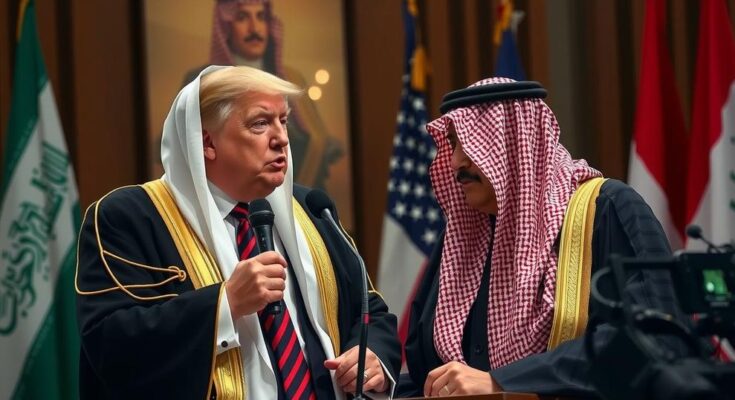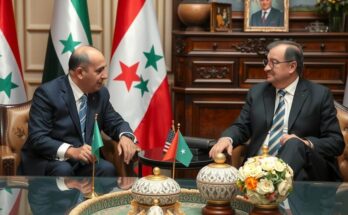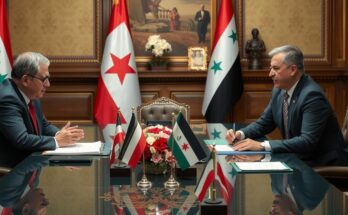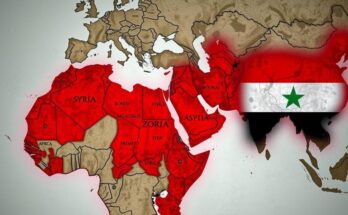Arab leaders congratulate Donald Trump on his election win, expressing hopes for an end to Middle East conflicts, particularly in Gaza and Lebanon. However, there are doubts about his strategies, especially concerning Israel and Iran. Key leaders emphasize that resolutions depend on establishing a Palestinian state and managing relations with Iran, while analysts expect pressure on Israel to conclude hostilities prior to Trump’s inauguration.
Following Donald Trump’s election victory, various Arab leaders extending their congratulations expressed both hopefulness and skepticism regarding his promises to end ongoing conflicts in the Middle East. Among the congratulatory messages were those from Saudi Arabia’s King Salman and Crown Prince Mohammed bin Salman, the leaders of the United Arab Emirates, and Qatar’s emir, Sheikh Tamim bin Hamad, all emphasizing the importance of strengthening strategic partnerships. Dania Koleilat Khatib, president of the Research Center for Cooperation and Peace Building in Beirut, commented on Trump’s focus during his campaign on building personal connections with Arab leaders, in contrast to what she characterized as President Biden’s transactional diplomacy. She noted that many Arab leaders are eager for Trump to fulfill his campaign promise of ceasing warfare in Gaza and Lebanon but questioned how he intends to achieve these goals, highlighting that initiatives toward establishing a Palestinian state remain uncertain. Concerns also linger regarding Israeli Prime Minister Benjamin Netanyahu’s aggressive stance toward Iran. Crown Prince bin Salman has reiterated that Saudi Arabia would not consider normalizing relations with Israel until the conflict in Gaza is resolved and a Palestinian state is recognized. Gulf nations have attempted to affirm their ties to Iran, indicating they would not permit Israeli airstrikes on Iranian territory. Iran responded to the American election by minimizing the significance of the results, expressing readiness for confrontation with Israel. Other leaders, including King Abdullah of Jordan, Egyptian President Abdel Fattah al-Sisi, and Lebanon’s caretaker Prime Minister Najib Makati, have similarly congratulated Trump and are actively involved in negotiations to end regional conflicts. Analyst Osama Al Sharif from Amman voiced the expectation that Trump would exert pressure on Netanyahu to conclude the conflicts prior to his inauguration, suggesting that the ongoing violence, particularly in Gaza, presents a politically toxic scenario for the new administration. Moreover, Al Sharif indicated that Trump might aim to tighten sanctions on Iran while finding avenues for diplomatic communication through Russian President Vladimir Putin. Nevertheless, he cautioned that any recognition of Israel’s annexation of territories in the West Bank by the Trump administration could dramatically complicate existing Palestinian affairs and relations with Jordan.
The implications of Donald Trump’s recent election victory resonate significantly within the Middle East, a region historically fraught with conflict and diplomatic tensions. Arab leaders, amidst congratulatory gestures, express a critical interest in Trump’s promised changes to U.S. foreign policy surrounding the region’s ongoing wars, particularly in Gaza and Lebanon. The importance of addressing relationships with Israel and Iran is paramount, as shifting alliances and regional dynamics are influenced by Trump’s policies and personal diplomatic style. The involvement of key figures such as Crown Prince Mohammed bin Salman and Iranian responses underscore the heightened importance of these developments for peace and stability in the region.
In sum, while Donald Trump’s election is met with congratulations from Arab leaders, the hopes for peace and conflict resolution in the Middle East rest heavily on his ability to navigate intricate regional dynamics. The challenges posed by Iran, the ongoing violence in Gaza and Lebanon, and the relations between Arab states and Israel are complex issues that may define Trump’s administration. Observers remain cautiously optimistic, yet deeply concerned about the potential ramifications of his policies on the already fragile state of regional affairs.
Original Source: www.voanews.com




